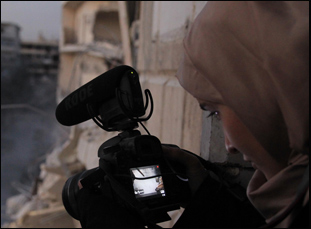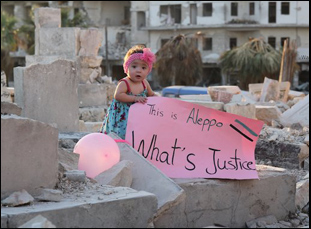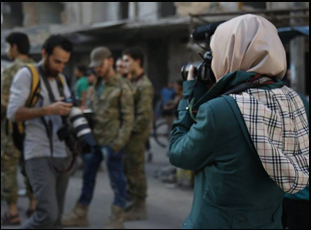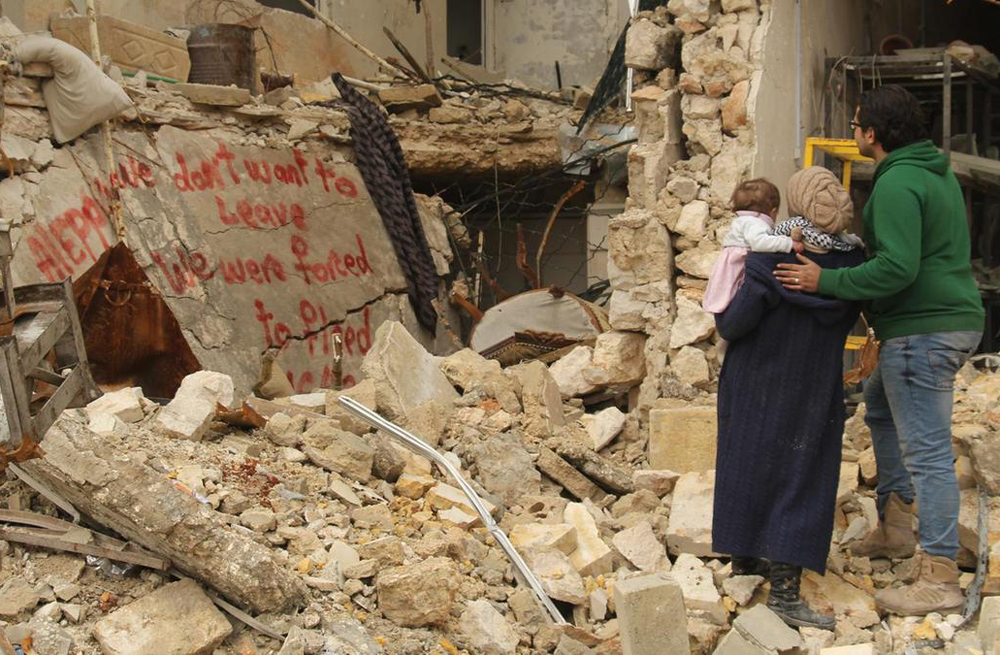Like a majority of Syrians who had watched their country fall into disarray under the regime of Bashir al-Assad leading to the eruption of civil war in 2011, Waad al-Kateab and her future husband Hamza faced the impossible choice whether to stay in Aleppo as it was bombarded with bombing and gunfire aimed at decimating any opposition to al-Assad or to leave the only home they had ever known. As others fled, al-Kateab was emboldened to stay, not out of a sense of pride – though surely there was plenty – but as a witness to an atrocity of historical proportions, and began collecting footage any way she could. This started simply enough, hitting the “record” button on her phone and then a consumer-grade camera, but when cluster bomb attacks began and another friend retreated from the city, al-Kateab asked if she could buy the camera drone that he left behind.
“We got it and I asked Hamza to come and shoot me as I was imagining this [scene],” al-Kateab recalls of one of the most surreal moments in “For Sama,” in which she walks around a ravaged Aleppo from the vantage point of the skies above. “Literally when I did that, I had no idea if that would work or not or if it will be something really useful or not, but I just felt it’s something that would be good.”
Indeed, what al-Kateab captures in “For Sama” is startling, though when framed as an explanation to her unborn child as to the circumstances that surrounded her birth, it becomes a film that removes any distance that may result from where it takes place or the inherent violence of the situation to put the unthinkable into human perspective. It’s notable that Waad and Hamza, two friends brought together romantically by the crisis, are wed with Patsy Cline’s “Crazy” playing in the background, and the pair do the best they can to make the best of awful circumstances. While Waad is busy filming life in Syria under relentless strife, Hamza has his hands full saving lives with a makeshift hospital that he and colleagues set up in Aleppo once it becomes clear that any infrastructure the city once had now lies in ruin. The prospect of a child brings considerable joy, but also a wave of anxiety when the couple fears for their own safety, let alone a new baby’s.
Still, the two exhibit tremendous grace under pressure in “For Sama,” filmed over the course of five years, and their fortitude leads to an undeniable public record of the brutality of the al-Assad regime. With Edward Watts, a British filmmaker who already had experience with the fragility of the Middle East from his work on the 2015 Frontline doc “Escape From ISIS,” brought on to help shape the film as an additional director, al-Kateab succeeds at putting together something powerful enough to seize the world’s attention, something that has been evident ever since “For Sama” premiered earlier this year at SXSW where it won both the Grand Jury Prize and Audience Award for Best Documentary. With the film now arriving in theaters, al-Kateab and Watts were in Los Angeles to talk about how they found a way to bring such an immediate call to arms to the screen while the tragedy is still unfolding in Syria and why making it more personal clarified what was most important to get across.

Waad al-Kateab: I started with my phone first and [then] some small secret cameras, like the key of the car and then it got bigger, so it was just learning from what I’ve done, but it was never like a course. Other people helped me. Then I’ve got one or two small courses for two or three days to learn how to use the camera or to learn how to do a news report, but it was all very something very simple. It was more about the experience every day and I had no idea about what it will be at the end, but I was very sure that it’s something really important. I was filming in two [story]lines – one about the personal experience that I have, and the second was as a filmmaker or a journalist, more about stories of the nurses [at the hospital] in a way which could work more than the news, just about documenting the evidence. All the things that I thought would work as war crimes evidence from the patients, I was taking all that and mixed in [to] my archive, and I shot all of it through the five years.
At one point relatively late in the film, someone clearly going through the trauma of seeing a loved one in the hospital asks you to “keep filming,” but I’ve heard early on, you were often discouraged from filming. Did it seem like people’s relationships with the camera change over time?
Waad al-Kateab: Yeah, there was a time when it was clear. Usually, our community as Syrians, we don’t use the camera. The camera, for us, is part of the regime — when you see a camera, that’s making evidence against the regime, so that means you’re risking your life more. And during the time I was living there [in Aleppo] and the camera was with me when I was going to the market to buy my stuff [or] the hospital when I was there normally, people used to see me — and I was pregnant — filming outside, and they’d have that look like, “Oh my God, what is she doing?” Sometimes people also saw that like “Oh, she’s playing with her camera,” like it’s nothing really serious about what I’m trying to do. But when people really realized that we were stuck and we have no idea about the end of this situation, some other people felt this is the only way we survive and this is the only way that the world outside will not let us down because they’ve seen this tragedy and this experience in front of their eyes. That’s what made them feel this is something that’ll help.
Edward, what point do you come into the process?
Edward Watts: Waad and I met for the first time three months after Aleppo had fallen and [her family was forced to leave]. She met with our colleagues at Channel Four and Channel Four News and she’d already done these incredible news reports, won an Emmy for them, but no one knew that she had all of this other material until after she left and brought all of these war-battered hard drives with her. It was all so very recent for [Waad], so she was also caught up in the emotion and hadn’t done really longform before, and everyone knew that I cared so much about Syria that they just thought I’d be a good person potentially to team up with her, just to do justice to her story.

Edward Watts: I was very close to the material by the end, [to the point where] she was like, “Please, relax” at one point. [laughs]
Waad al-Kateab: Yes, we were more about trying to have both sides together. I was more caring about the story from inside, how people who lived the story will see it as their story, and Edward, as much as he cared about this [as well], wanted to have something that people in the Western audience could really engage with, so two years [we were] fighting for these points.
Edward Watts: Yeah, [it was a] tug of war.
How did the framework come in, making this a film addressing your daughter?
Waad al-Kateab: We started with doing the story in a chronological way and we knew from the beginning that would not be the [exact] structure for the final film, but because we have a huge amount of archive, we both wanted to…
Edward Watts: …Map the landscape. You’re just trying to create a map of this whole history.
Waad al-Kateab: So [there] is a very, very nice sentence which Edward always says about the film always knows what it wants to be, and part of that [was] asking me, “Why don’t we make it for Sama?” And it’s like, ‘What? It’s [already] ‘For Sama’? What are you speaking about?” But he’s like, ‘Look, I know this is ‘For Sama,’ but I mean let’s make it directly for Sama [like you’re] speaking with her.” Because when I was shooting this footage,in some parts, I was speaking with her directly [to my daughter] even before she was born, I was speaking with her when I was pregnant and this sentence helped us all create everything around the idea of being for Sama.
Edward Watts: Yeah,the footage was already full of that feeling, but also the whole struggle was for Sama as well. Everything that was happening was for Sama.
Waad al-Kateab: Not just for my daughter, but it’s all about the future, the hope, the new generation and everything we’ve sacrificed in Syria just to have a better life in the future, so it’s for Sama and all the other children of Syria.

Waad al-Kateab: It’s really great, and a shock for me because when we were working on this for two years [in post-production], and even the five years we spend inside Aleppo, I thought the world isn’t caring anymore about what’s going on [in Syria]. And the film just gives me a lot of hope that people want to watch and know more and they even want to do something to help people in these circumstances. In many screenings, people from different backgrounds and different places have had that same engagement with the film — teens and parents who have children coming to us and saying, “I have a daughter the same age,” and it gives you a lot of hope about how people care.
Edward Watts: Yeah, it wasn’t that long ago that we were trying to finish this and it was just me, Waad and the editor late into the night, just wondering can we just finish it to our satisfaction? And throughout the process people were saying to us, “Well, everyone’s tired of Syria. We’ve seen it all and we know this story. Isn’t it over now anyway?” So to actually to see the real audiences don’t react like that, they’re impassioned by it and engaged is mindblowing, from this little very personal story of [this family] to reach around the world.
“For Sama” opens on July 26th in Los Angeles at the Monica Film Center and New York at the Quad Cinema.




